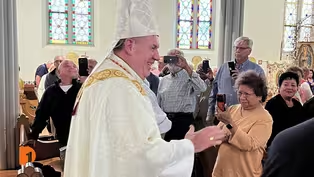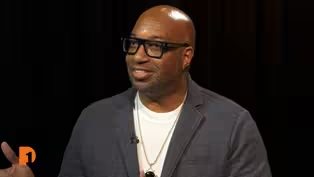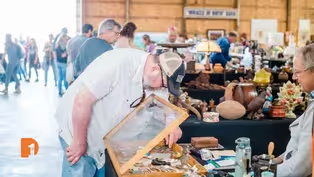
From educator to writer: Kyunghee Kim shares how she wrote her first book ‘See Us Bloom’
Clip: Season 9 Episode 44 | 6m 33sVideo has Closed Captions
Kyunghee Kim and Leo Chen join One Detroit’s AAPI Stories Series for AAPI Heritage Month.
May is Asian American Pacific Islander Heritage Month. Writer Kyunghee Kim and her husband Leo Chen joined One Detroit's AAPI Stories Series to talk about their evolving Asian American identities, pursuing new career paths, and the mutual support they received from each other. Kim talks about making the move to becoming an author and how she wrote her first book, “See Us Bloom."
Problems playing video? | Closed Captioning Feedback
Problems playing video? | Closed Captioning Feedback
One Detroit is a local public television program presented by Detroit PBS

From educator to writer: Kyunghee Kim shares how she wrote her first book ‘See Us Bloom’
Clip: Season 9 Episode 44 | 6m 33sVideo has Closed Captions
May is Asian American Pacific Islander Heritage Month. Writer Kyunghee Kim and her husband Leo Chen joined One Detroit's AAPI Stories Series to talk about their evolving Asian American identities, pursuing new career paths, and the mutual support they received from each other. Kim talks about making the move to becoming an author and how she wrote her first book, “See Us Bloom."
Problems playing video? | Closed Captioning Feedback
How to Watch One Detroit
One Detroit is available to stream on pbs.org and the free PBS App, available on iPhone, Apple TV, Android TV, Android smartphones, Amazon Fire TV, Amazon Fire Tablet, Roku, Samsung Smart TV, and Vizio.
Providing Support for PBS.org
Learn Moreabout PBS online sponsorship(upbeat music) (audience applauding) - How did you get from being an elementary school teacher to now being a writer and an author and creative?
- Well I taught for many years, and so in a lot of those years, I loved it because I used to teach Sunday school and would lead Bible study in college and was always kind of like a mentor figure.
And I enjoy teaching.
I started writing about five years ago, and it came to me as a big surprise.
This was after our IVF had failed and our adoption had failed.
And I was so, so heartbroken.
And an empty page in a notebook was the only thing, only person, only space that would accept me as I am without any words, without any advice basically.
And so I just wrote, wrote, wrote, wrote my heart out, mostly in journal form of me expressing my feelings and questions and lots of questions I had, especially to God as being a believer.
And so, but after writing for a couple of years, I just thought, "Oh, I really like this.
Maybe I want to be a writer.
Maybe I want to write a book."
The thought that I had then is still a thought that I have now, is like, I really want to record my parents' stories because I have a voice that they don't, and that voice is English.
And so that's what like motivated me, and then like another book on like grief and healing.
Because especially as Asian American people, grief is still not an emotion.
It's a feeling that we all probably feel maybe on a daily basis, but rarely expressed and talked about.
Especially in a community.
And a book can be such a common space where you read something together, you can come and talk about it, a mutual space.
And so I wanted those things to happen.
And so even though my first book is not a grief book, it's not my parents' stories.
But it was a way for me to get my voice, my name out there as a writer, as an author.
So why I wrote "See Us Bloom."
So this book is a book of poems, and it's a story about a little boy who moves into a new place with his family.
And I thought, well, I've been a teacher for 19 years, why don't I write a children's book and inspire some young kids, you know?
And so the children's book that's out now, "See Us Bloom," really came about through me going through my old journals and reading through all the affirmations that I said to myself and turning that into more kid-friendly language.
And I put that into a book for kids.
And maybe it wasn't the wisest decision when I don't really have a backup plan, but I'm like, I just have to quit or retire.
I really have to retire from this in order for me to go on this path.
And for me, I really work well under a little bit of pressure.
When there's like no other plan, I'm like, "Okay, I have to make this work."
And so that's kind of why I decided on this.
- So how did your parents take it when you shared with them that your book is published, and what was that like?
- Well, I didn't let my parents know until my book was physically in my hands.
And that was on purpose.
And I know that may sound like I turned my back against them, I kept something huge from them, which I did.
But I think when you're doing something so personal and maybe sacred, it's really, really important to think about who are you going to let in right away?
Because you're already so vulnerable, you don't know if this is going to work out.
And I knew that although my parents love me so, so much and because they love me, they might say, "You can't do this.
Like what are you doing?
You're leaving your very stable job with pension for this?
Like what are you doing?"
And so I couldn't have their voices in my head in order for me to keep on going.
And so there were lots of people I didn't tell right away.
- You didn't tell me right away.
- I didn't, I knew that you would support me, but you knew like midway through the journey.
- Yes, I knew when you signed with the publishing company.
- Like, guess what, honey?
I'm gonna be writing a book and I have a publishing company I'm working with.
So my parents knew when I physically had the book with me, and they found out because I took the book to them when we visited.
Ma, pa, look (speaking foreign language) I wrote a book, and they were shocked, they were confused, and they were super excited and very, very proud.
Like my mom literally said, "I'm so proud of you."
Which I don't remember her ever saying that to me.
When my mom was looking through the book, she was like, "Oh, I like to write too."
And she brought out stacks of journals, and I'm reading through it and they're poetry.
And she takes out a sketchbook and tells me that she loves to draw and she's been drawing and they're beautiful.
And that was the moment that I kind of realized like, oh, maybe like there is part of them that's in me because I always kind of wondered like.
- Where'd you get it from?
- Where did I get this love of arts from?
And writing, and language, and storytelling.
Seeing my mom's work in front of me when I shared my book was really beautiful and touching and really special.
Cardinal Joseph Tobin, a native Detroiter, could be first American pope
Video has Closed Captions
Clip: S9 Ep44 | 9m 7s | Cardinal Joseph Tobin’s family and friends talk about his childhood and life of faith and service. (9m 7s)
Kwame Alexander discusses the inspiration for his books and new PBS KIDS series
Video has Closed Captions
Clip: S9 Ep44 | 4m 39s | Best-selling author Kwame Alexander discusses his literary works, career and passion for writing. (4m 39s)
One Detroit Weekend | Things to do around Detroit this weekend: May 2, 2025
Video has Closed Captions
Clip: S9 Ep44 | 1m 58s | Ways to celebrate Cinco de Mayo, AAPI Heritage Month and more around metro Detroit. (1m 58s)
Providing Support for PBS.org
Learn Moreabout PBS online sponsorshipSupport for PBS provided by:
One Detroit is a local public television program presented by Detroit PBS














